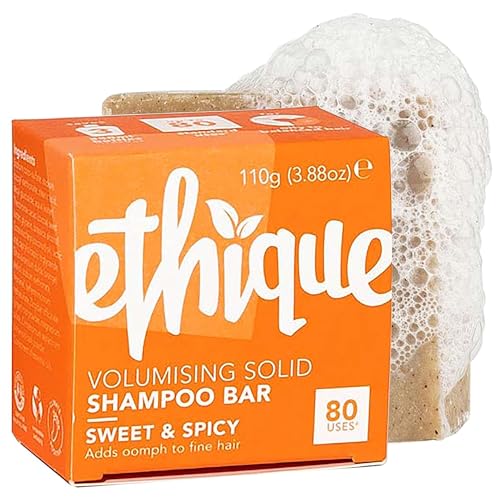
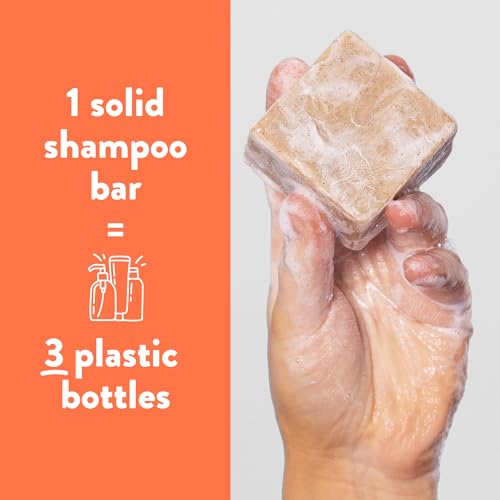
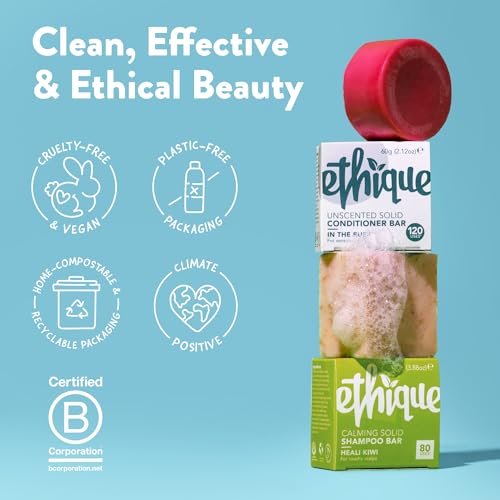
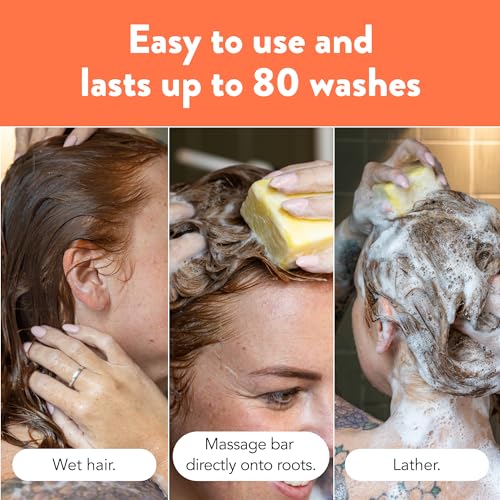
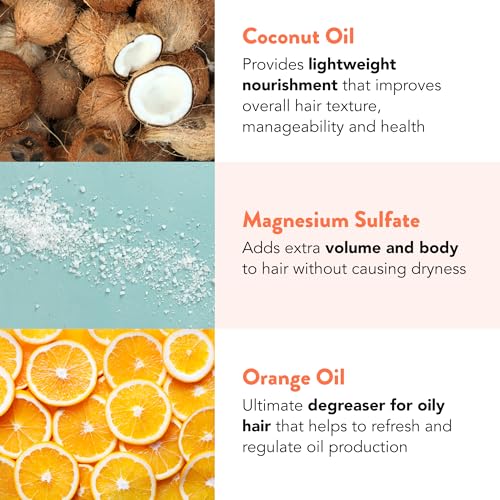
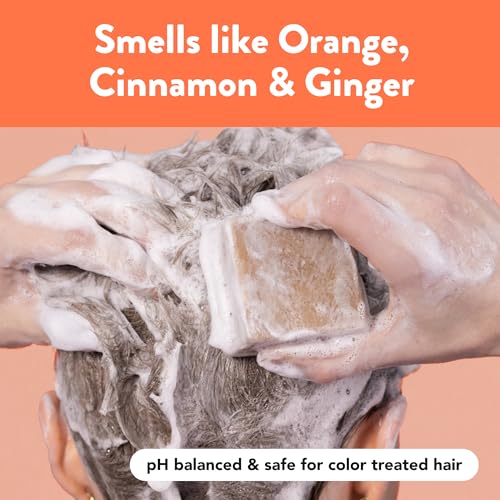
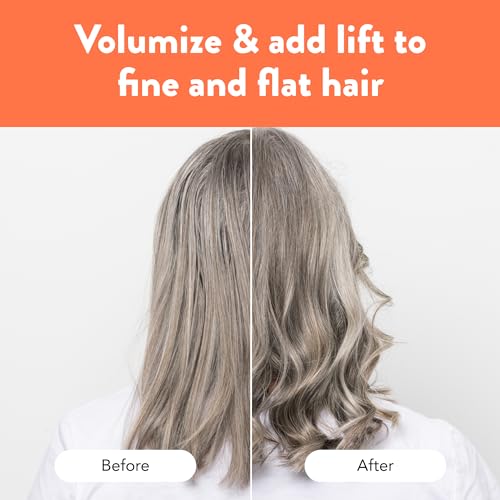
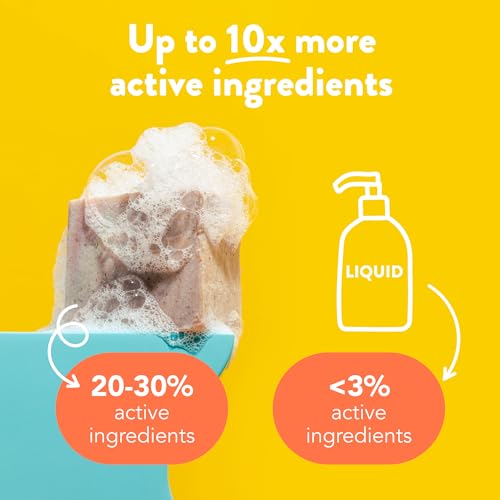
Ethique Sweet & Spicy Shampoo Bar - Volumizing, Vegan, Cruelty-Free - 3.88 oz


Lactic Acid, L
High RiskLactic acid is an organic acid commonly used in cosmetics and skincare products as an exfoliant and pH regulator. It helps in improving skin texture and hydration by promoting the shedding of dead skin cells and enhancing moisture retention.
Sustai Insights
Lactic acid offers functional benefits as an effective exfoliant and moisturizer, contributing to improved skin appearance. However, it poses potential risks, including skin irritation and enhanced absorption, which may lead to adverse effects. Regulatory bodies have noted use restrictions due to these concerns. Overall, the ingredient is considered high risk, necessitating cautious usage, particularly for sensitive skin. Alternatives like glycolic acid may provide similar benefits with potentially lower irritation.
Limonene
Medium RiskLimonene is a scent ingredient and solvent naturally found in citrus fruits, commonly used in personal care and cleaning products for its fragrant properties. It serves as a flavoring agent and enhances the overall sensory experience of products.
Sustai Insights
Limonene offers functional benefits such as acting as a solvent and fragrance enhancer. However, it carries a high allergenic potential, which can trigger skin or respiratory sensitivities in some individuals. Environmental concerns include moderate persistence and bioaccumulation, along with potential ecotoxicity. Regulatory restrictions necessitate verification in products containing this ingredient. Overall, the risk level is assessed as medium, emphasizing the importance of cautious use, particularly for sensitive populations. Safer alternatives may be considered to mitigate these risks.
Behenyl Trimonium Methosulfate
Medium RiskBehentrimonium methosulfate is a quaternary ammonium compound commonly used in personal care products as a conditioning agent. It functions effectively as a surfactant and emulsifier, helping to improve the texture and application of formulations, especially in hair care and skin products.
Sustai Insights
Behentrimonium methosulfate offers functional benefits as a conditioning agent, enhancing product performance in hair and skin applications. It is considered to have low health risks, with minimal concerns for carcinogenicity, allergies, or reproductive toxicity. Environmental risks are also low, with no evidence of bioaccumulation. However, regulatory bodies note some restrictions on its use in verified products. Overall, the ingredient presents a medium risk profile, highlighting the importance of adhering to safe usage practices and considering alternatives when available.
Citrus Aurantium Dulcis (Orange) Peel Oil
Medium RiskCitrus aurantium dulcis (orange) peel oil is derived from the peel of oranges and is commonly used in cosmetic and personal care products for its fragrance and potential skin benefits. It is known for its aromatic properties and is often included in formulations aimed at enhancing scent profiles.
Sustai Insights
Citrus aurantium dulcis (orange) peel oil offers functional benefits such as providing a pleasant scent and potential antimicrobial properties. However, it poses a high allergy risk and may cause skin irritation in sensitive individuals. Environmental concerns include moderate persistence and potential to contribute to pollution. Regulatory warnings indicate restrictions on use in certain products. Overall, the risk level is assessed as medium, and users are advised to practice caution, particularly those with known allergies. Alternatives like sweet orange essential oil may provide similar benefits with potentially lower risks.
Sodium Isethionate
Low RiskSodium isethionate is an organic salt commonly used in cosmetic formulations as a surfactant and cleansing agent. It aids in the removal of dirt and oil from the skin, enhancing the overall efficacy of personal care products such as shampoos and body washes.
Sustai Insights
Sodium isethionate offers functional benefits as a mild surfactant, making it effective in cleansing formulations while minimizing irritation. It is considered to have low health risks, with no significant concerns regarding carcinogenicity, allergies, or reproductive toxicity. Environmentally, it poses minimal risks, being non-bioaccumulative and not a major pollutant. Regulatory assessments indicate it’s approved in multiple regions with few restrictions. Usage should be aligned with recommended concentrations to ensure safety. Overall, sodium isethionate is classified as a low-risk ingredient, with no notable adverse effects.
Sodium Cocoyl Isethionate
Low RiskSodium cocoyl isethionate is a surfactant derived from coconut oil, commonly used in cosmetic formulations. It functions as a cleansing and foaming agent, contributing to the texture and effectiveness of personal care products such as shampoos and body washes. It helps to remove dirt and oils from the skin and hair.
Sustai Insights
Sodium cocoyl isethionate offers functional benefits as a gentle surfactant that effectively cleanses without stripping moisture. It is biodegradable and derived from renewable sources, enhancing its sustainability profile. Health risks are low, with minimal potential for irritation or allergies noted. Regulatory bodies have not imposed significant restrictions, indicating a favorable risk assessment overall. Usage should be within recommended concentrations to maintain safety. Alternatives include milder surfactants like decyl glucoside for those seeking gentler options. Overall, the ingredient is assessed to have a low risk.
Magnesium Sulfate
Low RiskMagnesium sulfate (Epsom salt) is an inorganic compound commonly used in various products for its properties as a drying agent, electrolyte, and muscle relaxant. It is often included in bath salts and personal care formulations to provide soothing effects.
Sustai Insights
Magnesium sulfate is effective as a muscle relaxant and is considered biodegradable, making it a sustainable choice. Health risks are minimal, with low concerns for carcinogenicity, allergenic potential, or reproductive toxicity. Environmental risks are also low, as it does not contribute significantly to pollution or bioaccumulation. Regulatory bodies have not issued significant warnings. Overall, the ingredient is assessed as low risk, with safe usage practices recommended, and it has few documented alternatives.
Decyl Glucoside
Low RiskDecyl glucoside is a glucose-based surfactant derived from natural sources, primarily used as a mild cleansing agent in personal care products. It effectively reduces surface tension, allowing for improved mixing of ingredients and enhanced cleansing properties without stripping natural oils from the skin.
Sustai Insights
Decyl glucoside offers functional benefits as a non-ionic surfactant, making it suitable for sensitive skin formulations. It is biodegradable and derived from renewable resources, supporting sustainability. Health risks are primarily low, with minimal concerns regarding irritation and allergies. Environmental risks are low, as it does not significantly contribute to pollution or bioaccumulation. Regulatory status is generally favorable, with low restrictions noted. Overall, decyl glucoside presents a low risk for use in consumer products, making it a suitable choice for gentle formulations.
Sodium Coco Sulfate
Low RiskSodium coco-sulfate is a sodium salt of the fatty acids derived from coconut oil. It primarily functions as a surfactant and cleansing agent in cosmetic formulations, helping to create lather and remove dirt and oils from the skin and hair.
Sustai Insights
Sodium coco-sulfate offers effective cleansing properties and is often considered biodegradable, contributing to its sustainability credentials. Health risks are minimal, with low concerns for carcinogenicity, allergies, and reproductive toxicity. Environmental risks are also low, excluding significant pollutant potential. Regulatory bodies have not issued major restrictions, confirming its safety for use. Overall, it is assessed with a low risk level. For those seeking alternatives, other milder surfactants like decyl glucoside may be considered.
Caprylic Triglyceride
Low RiskCaprylic triglyceride is an ester derived from coconut oil and glycerin, commonly used in cosmetic formulations as an emollient, stabilizer, and skin-conditioning agent. It helps to improve the texture and spreadability of products while providing a lightweight, non-greasy feel.
Sustai Insights
Caprylic triglyceride offers functional benefits such as enhanced skin moisturization and improved formulation stability. It is generally regarded as safe, with low concerns regarding carcinogenicity, allergenic potential, and reproductive toxicity. Environmental impact is minimal, with no significant pollutant or bioaccumulative properties identified. Regulatory bodies have not issued warnings or restrictions. Overall, the risk level is low, making it a suitable ingredient in cosmetic products. Safe usage practices include adhering to recommended concentrations, and while there are alternatives, caprylic triglyceride remains a reliable choice.
Water
Low RiskWater is a clear, colorless liquid essential for various biological processes. It serves as a solvent in formulations, facilitating the dissolution of other ingredients and enhancing product texture and application. Additionally, water plays a crucial role in hydration and is a key component in many cosmetic and personal care products.
Sustai Insights
Water is an effective solvent and hydrator, contributing to the texture and efficacy of formulations. It is biodegradable and generally regarded as safe, with low concerns regarding carcinogenicity, allergies, and reproductive toxicity. However, excessive water usage can lead to environmental concerns, particularly regarding resource depletion. Regulatory bodies do not impose restrictions on water use in cosmetics. Overall, the risks associated with water are low, making it a safe and essential ingredient.
Vegetarian Glycerin
Low RiskVegetarian glycerin, also known as glycerol, is a colorless, odorless, and viscous liquid derived from plant sources. It is primarily used as a humectant, solvent, and emollient in various personal care products, helping to retain moisture and improve texture.
Sustai Insights
Vegetarian glycerin offers functional benefits as an effective humectant, promoting hydration and skin smoothness. It is biodegradable and typically sustainably sourced. Health risks associated with glycerin are low, with no significant concerns for carcinogenicity, allergens, or reproductive toxicity. Environmental risks are minimal, and it is not subject to major regulatory warnings. Overall, the risk level for this ingredient is low, making it a safe choice in formulations. Safe usage practices include ensuring proper concentrations in products, and alternatives such as propylene glycol exist but may have differing properties.
Cocos Nucifera (Coconut) Oil
Low RiskCocos Nucifera (Coconut) Oil is derived from the kernels of the coconut palm. It is primarily used in cosmetic formulations for its emollient and moisturizing properties, making it suitable for skin and hair care products.
Sustai Insights
Coconut oil serves as an effective moisturizer and emollient, promoting skin hydration and softness. It is sustainably sourced and biodegradable. Health risks are minimal, with low concerns regarding carcinogenicity, allergens, and reproductive toxicity. Environmental impact is also low, as it does not contribute significantly to pollution or bioaccumulation. Regulatory bodies have not issued restrictions on its use. Overall, coconut oil presents a low risk for health and environmental concerns, making it a safe ingredient in cosmetic products.
Zingiber Officinale (Ginger) Root Powder
Low RiskZingiber officinale (ginger) root powder is a powdered form of the ginger root, commonly used in culinary applications and traditional medicine. It serves various functions, including flavor enhancement and potential health benefits due to its bioactive compounds.
Sustai Insights
Ginger root powder is recognized for its functional benefits, including antioxidant properties and potential digestive support. It is sustainably sourced and generally considered safe, with low risks of cancer, allergies, or reproductive toxicity. Regulatory bodies do not impose restrictions on its use. While it poses minimal health and environmental risks, including irritant potential in sensitive individuals, overall risk is assessed as low. Safe usage practices should be followed, and alternatives like turmeric may serve similar purposes.
Theobroma Cacao (Cocoa) Seed Butter
Low RiskTheobroma cacao (cocoa) seed butter is extracted from the roasted seeds of the cocoa plant. It is commonly used in cosmetics and skincare products for its emollient properties, helping to moisturize and soften the skin. Cocoa butter is also known for its stability and resistance to rancidity.
Sustai Insights
Cocoa butter is recognized for its effective moisturizing properties and is sustainably sourced, contributing to its appeal in personal care products. It poses low health risks, with minimal concerns regarding carcinogenicity, allergies, or reproductive toxicity. Environmentally, it does not significantly contribute to pollution or bioaccumulation. Regulatory bodies impose few restrictions, affirming its safety. Overall, the risk associated with cocoa seed butter is low, making it a favorable ingredient in cosmetics. Alternatives include shea butter or plant oils for similar emollient benefits.
Stearic Acid
Low RiskStearic acid is a naturally occurring fatty acid commonly found in animal and vegetable fats. It functions primarily as an emulsifier, thickener, and stabilizer in cosmetic and personal care products, providing texture and consistency.
Sustai Insights
Stearic acid offers functional benefits such as effective emulsification and stabilization of formulations. It is derived from renewable sources and is biodegradable, contributing to its sustainability profile. Health risks are low, with minimal concerns regarding carcinogenicity, allergies, or reproductive toxicity. Environmental risks are also low, with no significant pollutants or bioaccumulation concerns noted. Regulatory bodies, including the FDA, do not impose restrictions on its use. Overall, stearic acid is assessed as low risk, and its safe usage practices are well-established, with no significant alternatives needed.
Brassica Alcohol
Low RiskBrassica alcohol is a fatty alcohol derived from the seeds of Brassica plants, commonly used in cosmetic formulations as an emollient and surfactant. It helps to enhance texture and stability, providing a smooth application in various personal care products.
Sustai Insights
Brassica alcohol offers functional benefits as an emollient and stabilizer, with low associated health risks such as carcinogenicity, allergies, or reproductive toxicity. Environmentally, it poses minimal hazards, being neither a pollutant nor bioaccumulative. Regulatory status indicates no current restrictions. Overall, it is considered low risk, with safe usage practices encouraged. Alternatives may include other fatty alcohols, depending on formulation requirements.
Sodium Isethionate
Low RiskSodium isethionate is an organic salt commonly used in cosmetic formulations as a surfactant and cleansing agent. It aids in the removal of dirt and oil from the skin, enhancing the overall efficacy of personal care products such as shampoos and body washes.
Sustai Insights
Sodium isethionate offers functional benefits as a mild surfactant, making it effective in cleansing formulations while minimizing irritation. It is considered to have low health risks, with no significant concerns regarding carcinogenicity, allergies, or reproductive toxicity. Environmentally, it poses minimal risks, being non-bioaccumulative and not a major pollutant. Regulatory assessments indicate it’s approved in multiple regions with few restrictions. Usage should be aligned with recommended concentrations to ensure safety. Overall, sodium isethionate is classified as a low-risk ingredient, with no notable adverse effects.
Sodium Cocoyl Isethionate
Low RiskSodium cocoyl isethionate is a surfactant derived from coconut oil, commonly used in cosmetic formulations. It functions as a cleansing and foaming agent, contributing to the texture and effectiveness of personal care products such as shampoos and body washes. It helps to remove dirt and oils from the skin and hair.
Sustai Insights
Sodium cocoyl isethionate offers functional benefits as a gentle surfactant that effectively cleanses without stripping moisture. It is biodegradable and derived from renewable sources, enhancing its sustainability profile. Health risks are low, with minimal potential for irritation or allergies noted. Regulatory bodies have not imposed significant restrictions, indicating a favorable risk assessment overall. Usage should be within recommended concentrations to maintain safety. Alternatives include milder surfactants like decyl glucoside for those seeking gentler options. Overall, the ingredient is assessed to have a low risk.
Magnesium Sulfate
Low RiskMagnesium sulfate (Epsom salt) is an inorganic compound commonly used in various products for its properties as a drying agent, electrolyte, and muscle relaxant. It is often included in bath salts and personal care formulations to provide soothing effects.
Sustai Insights
Magnesium sulfate is effective as a muscle relaxant and is considered biodegradable, making it a sustainable choice. Health risks are minimal, with low concerns for carcinogenicity, allergenic potential, or reproductive toxicity. Environmental risks are also low, as it does not contribute significantly to pollution or bioaccumulation. Regulatory bodies have not issued significant warnings. Overall, the ingredient is assessed as low risk, with safe usage practices recommended, and it has few documented alternatives.
Decyl Glucoside
Low RiskDecyl glucoside is a glucose-based surfactant derived from natural sources, primarily used as a mild cleansing agent in personal care products. It effectively reduces surface tension, allowing for improved mixing of ingredients and enhanced cleansing properties without stripping natural oils from the skin.
Sustai Insights
Decyl glucoside offers functional benefits as a non-ionic surfactant, making it suitable for sensitive skin formulations. It is biodegradable and derived from renewable resources, supporting sustainability. Health risks are primarily low, with minimal concerns regarding irritation and allergies. Environmental risks are low, as it does not significantly contribute to pollution or bioaccumulation. Regulatory status is generally favorable, with low restrictions noted. Overall, decyl glucoside presents a low risk for use in consumer products, making it a suitable choice for gentle formulations.
Limonene
Medium RiskLimonene is a scent ingredient and solvent naturally found in citrus fruits, commonly used in personal care and cleaning products for its fragrant properties. It serves as a flavoring agent and enhances the overall sensory experience of products.
Sustai Insights
Limonene offers functional benefits such as acting as a solvent and fragrance enhancer. However, it carries a high allergenic potential, which can trigger skin or respiratory sensitivities in some individuals. Environmental concerns include moderate persistence and bioaccumulation, along with potential ecotoxicity. Regulatory restrictions necessitate verification in products containing this ingredient. Overall, the risk level is assessed as medium, emphasizing the importance of cautious use, particularly for sensitive populations. Safer alternatives may be considered to mitigate these risks.
Lactic Acid, L
High RiskLactic acid is an organic acid commonly used in cosmetics and skincare products as an exfoliant and pH regulator. It helps in improving skin texture and hydration by promoting the shedding of dead skin cells and enhancing moisture retention.
Sustai Insights
Lactic acid offers functional benefits as an effective exfoliant and moisturizer, contributing to improved skin appearance. However, it poses potential risks, including skin irritation and enhanced absorption, which may lead to adverse effects. Regulatory bodies have noted use restrictions due to these concerns. Overall, the ingredient is considered high risk, necessitating cautious usage, particularly for sensitive skin. Alternatives like glycolic acid may provide similar benefits with potentially lower irritation.
Sodium Coco Sulfate
Low RiskSodium coco-sulfate is a sodium salt of the fatty acids derived from coconut oil. It primarily functions as a surfactant and cleansing agent in cosmetic formulations, helping to create lather and remove dirt and oils from the skin and hair.
Sustai Insights
Sodium coco-sulfate offers effective cleansing properties and is often considered biodegradable, contributing to its sustainability credentials. Health risks are minimal, with low concerns for carcinogenicity, allergies, and reproductive toxicity. Environmental risks are also low, excluding significant pollutant potential. Regulatory bodies have not issued major restrictions, confirming its safety for use. Overall, it is assessed with a low risk level. For those seeking alternatives, other milder surfactants like decyl glucoside may be considered.
Caprylic Triglyceride
Low RiskCaprylic triglyceride is an ester derived from coconut oil and glycerin, commonly used in cosmetic formulations as an emollient, stabilizer, and skin-conditioning agent. It helps to improve the texture and spreadability of products while providing a lightweight, non-greasy feel.
Sustai Insights
Caprylic triglyceride offers functional benefits such as enhanced skin moisturization and improved formulation stability. It is generally regarded as safe, with low concerns regarding carcinogenicity, allergenic potential, and reproductive toxicity. Environmental impact is minimal, with no significant pollutant or bioaccumulative properties identified. Regulatory bodies have not issued warnings or restrictions. Overall, the risk level is low, making it a suitable ingredient in cosmetic products. Safe usage practices include adhering to recommended concentrations, and while there are alternatives, caprylic triglyceride remains a reliable choice.
Behenyl Trimonium Methosulfate
Medium RiskBehentrimonium methosulfate is a quaternary ammonium compound commonly used in personal care products as a conditioning agent. It functions effectively as a surfactant and emulsifier, helping to improve the texture and application of formulations, especially in hair care and skin products.
Sustai Insights
Behentrimonium methosulfate offers functional benefits as a conditioning agent, enhancing product performance in hair and skin applications. It is considered to have low health risks, with minimal concerns for carcinogenicity, allergies, or reproductive toxicity. Environmental risks are also low, with no evidence of bioaccumulation. However, regulatory bodies note some restrictions on its use in verified products. Overall, the ingredient presents a medium risk profile, highlighting the importance of adhering to safe usage practices and considering alternatives when available.
Water
Low RiskWater is a clear, colorless liquid essential for various biological processes. It serves as a solvent in formulations, facilitating the dissolution of other ingredients and enhancing product texture and application. Additionally, water plays a crucial role in hydration and is a key component in many cosmetic and personal care products.
Sustai Insights
Water is an effective solvent and hydrator, contributing to the texture and efficacy of formulations. It is biodegradable and generally regarded as safe, with low concerns regarding carcinogenicity, allergies, and reproductive toxicity. However, excessive water usage can lead to environmental concerns, particularly regarding resource depletion. Regulatory bodies do not impose restrictions on water use in cosmetics. Overall, the risks associated with water are low, making it a safe and essential ingredient.
Vegetarian Glycerin
Low RiskVegetarian glycerin, also known as glycerol, is a colorless, odorless, and viscous liquid derived from plant sources. It is primarily used as a humectant, solvent, and emollient in various personal care products, helping to retain moisture and improve texture.
Sustai Insights
Vegetarian glycerin offers functional benefits as an effective humectant, promoting hydration and skin smoothness. It is biodegradable and typically sustainably sourced. Health risks associated with glycerin are low, with no significant concerns for carcinogenicity, allergens, or reproductive toxicity. Environmental risks are minimal, and it is not subject to major regulatory warnings. Overall, the risk level for this ingredient is low, making it a safe choice in formulations. Safe usage practices include ensuring proper concentrations in products, and alternatives such as propylene glycol exist but may have differing properties.
Cocos Nucifera (Coconut) Oil
Low RiskCocos Nucifera (Coconut) Oil is derived from the kernels of the coconut palm. It is primarily used in cosmetic formulations for its emollient and moisturizing properties, making it suitable for skin and hair care products.
Sustai Insights
Coconut oil serves as an effective moisturizer and emollient, promoting skin hydration and softness. It is sustainably sourced and biodegradable. Health risks are minimal, with low concerns regarding carcinogenicity, allergens, and reproductive toxicity. Environmental impact is also low, as it does not contribute significantly to pollution or bioaccumulation. Regulatory bodies have not issued restrictions on its use. Overall, coconut oil presents a low risk for health and environmental concerns, making it a safe ingredient in cosmetic products.
Zingiber Officinale (Ginger) Root Powder
Low RiskZingiber officinale (ginger) root powder is a powdered form of the ginger root, commonly used in culinary applications and traditional medicine. It serves various functions, including flavor enhancement and potential health benefits due to its bioactive compounds.
Sustai Insights
Ginger root powder is recognized for its functional benefits, including antioxidant properties and potential digestive support. It is sustainably sourced and generally considered safe, with low risks of cancer, allergies, or reproductive toxicity. Regulatory bodies do not impose restrictions on its use. While it poses minimal health and environmental risks, including irritant potential in sensitive individuals, overall risk is assessed as low. Safe usage practices should be followed, and alternatives like turmeric may serve similar purposes.
Theobroma Cacao (Cocoa) Seed Butter
Low RiskTheobroma cacao (cocoa) seed butter is extracted from the roasted seeds of the cocoa plant. It is commonly used in cosmetics and skincare products for its emollient properties, helping to moisturize and soften the skin. Cocoa butter is also known for its stability and resistance to rancidity.
Sustai Insights
Cocoa butter is recognized for its effective moisturizing properties and is sustainably sourced, contributing to its appeal in personal care products. It poses low health risks, with minimal concerns regarding carcinogenicity, allergies, or reproductive toxicity. Environmentally, it does not significantly contribute to pollution or bioaccumulation. Regulatory bodies impose few restrictions, affirming its safety. Overall, the risk associated with cocoa seed butter is low, making it a favorable ingredient in cosmetics. Alternatives include shea butter or plant oils for similar emollient benefits.
Stearic Acid
Low RiskStearic acid is a naturally occurring fatty acid commonly found in animal and vegetable fats. It functions primarily as an emulsifier, thickener, and stabilizer in cosmetic and personal care products, providing texture and consistency.
Sustai Insights
Stearic acid offers functional benefits such as effective emulsification and stabilization of formulations. It is derived from renewable sources and is biodegradable, contributing to its sustainability profile. Health risks are low, with minimal concerns regarding carcinogenicity, allergies, or reproductive toxicity. Environmental risks are also low, with no significant pollutants or bioaccumulation concerns noted. Regulatory bodies, including the FDA, do not impose restrictions on its use. Overall, stearic acid is assessed as low risk, and its safe usage practices are well-established, with no significant alternatives needed.
Citrus Aurantium Dulcis (Orange) Peel Oil
Medium RiskCitrus aurantium dulcis (orange) peel oil is derived from the peel of oranges and is commonly used in cosmetic and personal care products for its fragrance and potential skin benefits. It is known for its aromatic properties and is often included in formulations aimed at enhancing scent profiles.
Sustai Insights
Citrus aurantium dulcis (orange) peel oil offers functional benefits such as providing a pleasant scent and potential antimicrobial properties. However, it poses a high allergy risk and may cause skin irritation in sensitive individuals. Environmental concerns include moderate persistence and potential to contribute to pollution. Regulatory warnings indicate restrictions on use in certain products. Overall, the risk level is assessed as medium, and users are advised to practice caution, particularly those with known allergies. Alternatives like sweet orange essential oil may provide similar benefits with potentially lower risks.
Brassica Alcohol
Low RiskBrassica alcohol is a fatty alcohol derived from the seeds of Brassica plants, commonly used in cosmetic formulations as an emollient and surfactant. It helps to enhance texture and stability, providing a smooth application in various personal care products.
Sustai Insights
Brassica alcohol offers functional benefits as an emollient and stabilizer, with low associated health risks such as carcinogenicity, allergies, or reproductive toxicity. Environmentally, it poses minimal hazards, being neither a pollutant nor bioaccumulative. Regulatory status indicates no current restrictions. Overall, it is considered low risk, with safe usage practices encouraged. Alternatives may include other fatty alcohols, depending on formulation requirements.
Discover the Ethique Sweet & Spicy Volumizing Solid Shampoo Bar, designed to breathe life and volume into fine, flat hair. This eco-friendly, vegan shampoo bar not only delivers excellent lather but also supports your commitment to sustainability.
- Volumizing Power: Revitalize limp hair with a shampoo bar that adds bounce and fullness without heaviness, creating a lively look.
- Nourishing Ingredients: Enriched with fairly traded cocoa butter and Samoan coconut oil, this bar nourishes and softens strands while a hint of sea salt invigorates hair.
- Cost-Effective & Eco-Friendly: Lasting at least 80 washes, this bar is equivalent to three bottles of liquid shampoo, saving you money and reducing plastic waste.
- Plastic-Free Packaging: Featuring recyclable, home-compostable packaging, you can compost the box to enrich your garden soil.
- Ethical Sourcing: Made with cruelty-free, palm oil-free, and paraben-free ingredients, Ethique supports sustainable producers with fair wages.
Elevate your hair care routine while making a positive impact on the planet.
Subscribe & Save with Sustai
- Best Price Guarantee: Always enjoy the lowest prices on sustainable home essentials.
- No Surprises: We’ll notify you before shipping. No hidden fees, ever.
- You’re in Charge: Change, pause, or cancel your subscription anytime with ease.
- Eco-Friendly Deliveries: Our grouped shipments mean less packaging and lower emissions.
Join us on a sustainable journey. Special offers for a limited time! Prices and promotions may change.
Recommended Products
Discover the Ethique Sweet & Spicy Volumizing Solid Shampoo Bar, designed to breathe life and volume into fine, flat hair. This eco-friendly, vegan shampoo bar not only delivers excellent lather but also supports your commitment to sustainability.
- Volumizing Power: Revitalize limp hair with a shampoo bar that adds bounce and fullness without heaviness, creating a lively look.
- Nourishing Ingredients: Enriched with fairly traded cocoa butter and Samoan coconut oil, this bar nourishes and softens strands while a hint of sea salt invigorates hair.
- Cost-Effective & Eco-Friendly: Lasting at least 80 washes, this bar is equivalent to three bottles of liquid shampoo, saving you money and reducing plastic waste.
- Plastic-Free Packaging: Featuring recyclable, home-compostable packaging, you can compost the box to enrich your garden soil.
- Ethical Sourcing: Made with cruelty-free, palm oil-free, and paraben-free ingredients, Ethique supports sustainable producers with fair wages.
Elevate your hair care routine while making a positive impact on the planet.

You can have at most 2 Sustainable Steals products in your cart
Customer Reviews
Customers’ View
Customers appreciate the Ethique Sweet & Spicy Volumizing Shampoo Bar for its effectiveness and eco-friendly formulation. Many users commend its pleasant, subtle scent, noting that it offers a refreshing experience without being overpowering. The shampoo bar is praised for its lathering ability and ease of rinsing, leaving hair feeling clean and soft. Additionally, customers highlight the nourishing ingredients, which contribute to healthier, more manageable hair. While feedback on longevity is mixed, with some suggesting it may not last as long as advertised, overall, users find this shampoo bar aligns well with their commitment to sustainable personal care products. In summary, customers value this product for its performance and eco-conscious attributes.
AI-generated from the text of customer reviewsThis product is rated 4.5 of 5.0 stars.
It has received 101 reviews.




